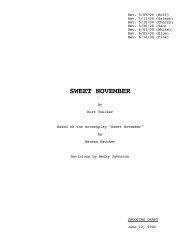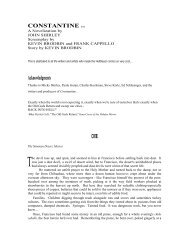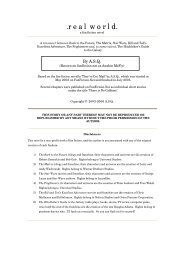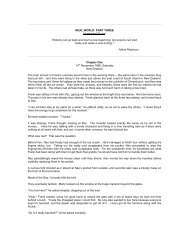Queer Keanu: Race, Sexuality and the Politics of - Whoa is (Not) Me
Queer Keanu: Race, Sexuality and the Politics of - Whoa is (Not) Me
Queer Keanu: Race, Sexuality and the Politics of - Whoa is (Not) Me
You also want an ePaper? Increase the reach of your titles
YUMPU automatically turns print PDFs into web optimized ePapers that Google loves.
o<strong>the</strong>r “natural” categories as race. She explains by saying, “In effect, one way that gender<br />
gets naturalized <strong>is</strong> through being constructed as an inner psychic or physical necessity.<br />
An yet, it <strong>is</strong> always a surface sign, a signification on <strong>and</strong> with <strong>the</strong> public body that<br />
produces th<strong>is</strong> illusion <strong>of</strong> inner depth, necessity or essence that <strong>is</strong> somehow magically,<br />
causally expressed” (Imitation, 28).<br />
The accusation that Reeves <strong>is</strong> all surface beauty with no depth assumes that <strong>the</strong>re<br />
should be an essential self that reveals itself to <strong>the</strong> perceptive viewer. Where <strong>is</strong> <strong>the</strong><br />
au<strong>the</strong>ntic core that lies beneath or behind <strong>the</strong> image? DeAngel<strong>is</strong> describes Reeves star<br />
appeal saying, “Star <strong>and</strong> fan d<strong>is</strong>course <strong>of</strong>ten attribute <strong>the</strong> mystery <strong>and</strong> fascination <strong>of</strong><br />
Reeves’s persona to its opacity, its propensity to change unexpectedly, <strong>and</strong> its ability to<br />
exceed any single image or description” (192). Just as Reeves’ star persona puts into<br />
question <strong>the</strong> notion <strong>of</strong> an unchanging, generative, identity, h<strong>is</strong> onscreen presence also<br />
res<strong>is</strong>ts reading. Ra<strong>the</strong>r than providing a “window into <strong>the</strong> soul, “ Reeves’ acting <strong>is</strong> <strong>of</strong>ten<br />
describes as soulless, a description perfectly in keeping with a postEnlightenment<br />
underst<strong>and</strong>ing <strong>of</strong> <strong>the</strong> individual <strong>and</strong> identity.<br />
Reeves <strong>and</strong> <strong>the</strong> <strong>Politics</strong> <strong>of</strong> <strong>the</strong> Closet<br />
By destabilizing sexuality <strong>and</strong> race, <strong>the</strong>n, Reeves also destabilizes subjectivity.<br />
The resulting freedom from <strong>the</strong> dictates <strong>of</strong> an essential identity would seem to empower<br />
Reeves, to give him control over such seemingly intractable “problems” <strong>of</strong> race <strong>and</strong>













